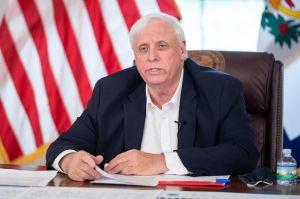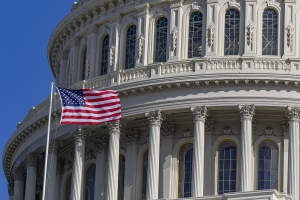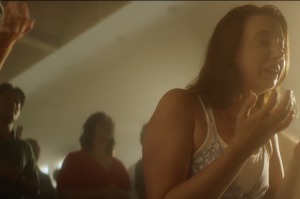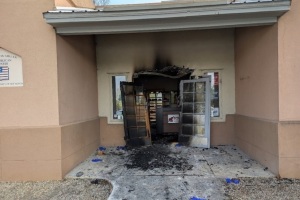Interview: Osteen on the Presidential Candidates, Teaching Theology
WASHINGTON – Shaking hands with hundreds of faithful readers and listeners at a local bookstore, Pastor Joel Osteen heard countless "thank you's" as he signed their books.
The book-signing event at Books-A-Million on Sept. 5 was his first stop in the nation's capital where he would later preach a message of hope to thousands that night. Some were ecstatic with joy and some, genuinely touched, as they told Osteen how much he has made a difference in their lives and how they listen to him every week. One visitor even invited him to his home country, Japan, to preach.
Osteen, who pastors one of the largest churches in the country – Lakewood Church in Houston, Texas – has heard the same "thank you's" and "you've changed my life" comments for years but he says he just feels more inspired every time he hears them. The Christian Post had a chance to sit down with the megachurch pastor and best-selling author at the bookstore.
CP: Regarding the principles you lay out in your book, how do you feel people who are in difficult circumstances (i.e. the downturn in the economy, hurricanes and persecution overseas) can really live out these principles when facing the harsh reality?
Osteen: I think that you have to realize it's just one step at a time and that even when those negative things happen we just have to come back to the fact that God's still in control and that really believe that Scripture says that He'll give us strength for every battle we fight.
i think it's just coming back to that place of you know what I'm not going to get upset, I'm not going to lose my faith, I'm just going to believe and trust that God's still in control.
CP: Was there any point in your life where you fell away from faith? What was the most trying time for your faith?
Osteen: I never did [fall away]. My dad was of course a minister. I never rebelled or went through drugs or anything like that.
I think during my mother, when she was very sick with cancer, that was very hard on our family. I don't think we doubted. It's just it's hard to see anybody when you're told that they're going to die ... that was a real trying time, but again we believed and God worked it all out.
CP: I know you don't like to talk politics much, but since you've come to Washington, I just wanted to get your thoughts on this year's election, how you feel it's going especially with the wide attention on both parties drawing Christian voters.
Osteen: There's good and great things in both candidates. They're both great leaders. I always encourage our congregation to search their own heart and vote what they feel God wants them to. I think that if we'll do our part, God will put the right person in office.
CP: Have your congregants come to you for political advice?
Osteen: Not so much about political stuff. I try not to weigh in a lot on that rather than just make sure we vote and do our part.
CP: What do you personally look for in a candidate?
Osteen: I look at their character, the life they've lived and what they stand for – just some of those main character issues. And of course where they're going to take the country what their vision is for it. I don't know if I've made a choice just yet. I'm still watching.
CP: And what did you think about Pastor Rick Warren hosting the two major presidential candidates last month?
Osteen: I thought it was great. It gave good insight into who they are. Nobody more qualified to do it than Rick Warren so I think it's great.
CP: You talk about criticism in your book and address your own critics. You say you don't allow what people are saying to distract you and that not everyone's going to understand you. What would you say is most misunderstood about you?
Osteen: Hm ... I guess mainly that people think that ... just the fact that we're presenting hope that we present the Gospel as good news, as God being good, some people think that ... I don't know if it's misunderstood ... that's what I feel like my calling is. I realize I'm not the only one that's doing it right. I'm just one part of what God wants us to do on the earth so I really feel that I'm running my race and maybe people don't necessarily see that.
CP: You said you weren't called to expound on theological doctrine or every part of Scripture. Your calling is to inspire people. I'm sure everyone who hears your message leaves inspired, but do you feel your listeners have a greater grasp of Scripture that Christians should have?
Osteen: To get a greater grasp of the theology and some of the core doctrine, we have classes for people to take there at the church. I think again my gift is to help people to live out the Christian life because you can have a lot of knowledge but if you don't know how to forgive when people hurt you, have a good attitude, expect good things, I feel like that's my main gifting. But I do believe we need to know what Jesus did when he died, what it all meant. And we have people that teach that. Always to me, it helps to know more of God's word.
CP: Do many of the people who attend your church take those classes?
Osteen: We have thousands that attend different classes. There's courses we've been through over the years. Plus, on Wednesday nights, when I'm not speaking, it's more of a Bible study as well. Again, I feel that my gifting and the calling of our ministry is to teach people how to live the Christian life. My main focus is on that part of it. To me, to win people over, to bring them to Christ they need to know … it makes a difference to serve the Lord, you're going to have a new strength you're going to have the right attitude.
CP: How would you best describe yourself? An evangelical? A pastor? A televangelist?
Osteen: I don't know. I'm a pastor. I don't like the word televangelist ... I'm a minster, a pastor ... I guess, yeah, I think I fit under the term evangelical. Sometimes, it ("evangelical") was kind of used … as in times past it seemed like it was kind of a political term. I just like to be called a pastor.
CP: There was a study done about what "evangelical" means to people and many people either don't know or can't agree on a definition.
Osteen: For years people asked me, I always thought … I said I guess I am. I don't know what it means. One day I read where it means you believe in Jesus and the Bible and sharing your faith – I said "then I am one."
CP: Going back to your book, near the end you talk about waiting with expectancy. Around this election time, many are probably praying and waiting for change in the country. What kind of actions should Americans be putting behind their prayers at this time?
Osteen: I think God's called people to rise up and run for offices ... we encourage our people to get involved in candidates they believe in in terms of for the country. I encourage things like that.





























